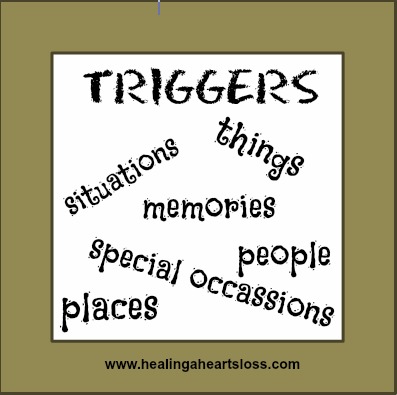Continuing from the prior blog post this month about “Families & Veterans: How Grief and Loss Continue after War” I have provided information about triggers associated with Veterans which share components with grief and loss in general.
The term “Trigger” is often associated with Post Traumatic Stress Disorder, or Operational Stress Injuries. A “trigger” is something that may bring on symptoms. While people who share the same mental health condition may have similar triggers, triggers can also be highly individual. Helpful in the recovery process is learning what your triggers are, finding positive ways to cope with them and to share this information with your family so they can help.
Triggers fall into two categories: Internal and External
Internal triggers are things that you feel or experience inside your body. They include thoughts or memories, emotions, and body sensations (for example, your heart racing). External triggers are things that happen outside your body. They include situations, people or places that you might encounter throughout your day.
Listed below are some common internal and external triggers.
Internal triggers
• Anger
• Anxiety
• Sadness
• Memories
• Feeling lonely
• Feeling abandoned
• Frustration
• Feeling out of control
• Feeling vulnerable
• Racing heart beat
• Pain
External Triggers
• An argument
• Seeing a car crash
• Certain smells
• The end of a relationship
• An anniversary
• Holidays
• A specific place
• Watching a television show or reading an article that reminds you of an event
• Seeing someone who reminds you of a person connected to your traumatic event
Coping with Triggers***
It is important to have ways to cope with triggers. There are many different healthy strategies to use including:
• Social support
• Deep breathing
• Relaxation
• Grounding
• Journaling
NOTE: Some people can actually become triggered by trying to identify their triggers.
Before taking steps to identify your triggers make sure you involve your counsellor or at the least, make sure you have a safety plan in place in case you experience some distress.
Another strategy is to educate and communicate with your loved ones.
It is not important for family members to know what the traumatic experience is, as much as it is important to know how it affects the person with the OSI.
All my best,
Barbara Gillett Saunders

